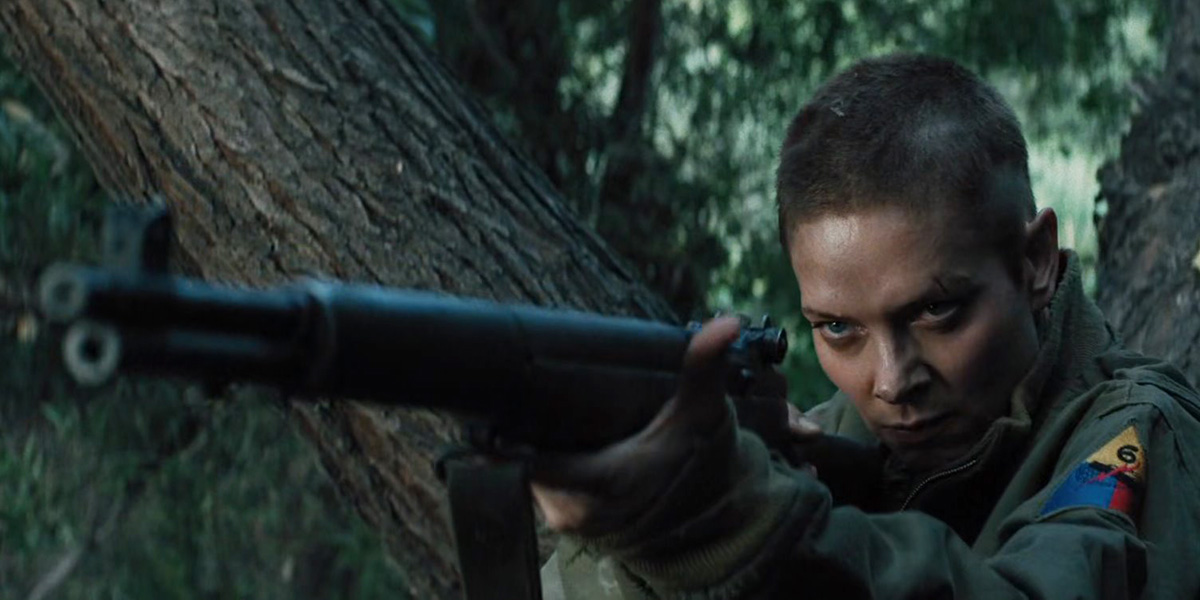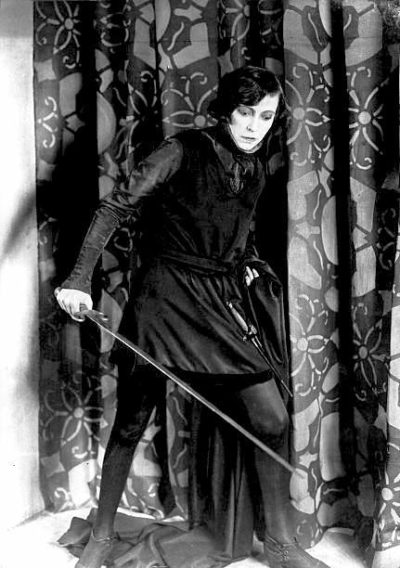★★★
“No business like snow business.”
 I do admire a film which does not hang about, and this certainly qualifies. We begin with Ava Bravo (del Castillo) removing a hood to find herself in a very remote, snowbound mountain cabin. A cassette player nearby has a message. She has been abducted by Buddy King (Blucas), a millionaire with a fondness for kidnapping trauma survivors and hunting them through the wilderness. There’s a snowmobile parked five miles North, if she can make it across the winter terrain there. To make it fairer, Buddy has only three bullets for his gun. Oh, and he’s going to be coming up from the basement in ten seconds. Safe to say, this is the kind of start that grabbed my attention.
I do admire a film which does not hang about, and this certainly qualifies. We begin with Ava Bravo (del Castillo) removing a hood to find herself in a very remote, snowbound mountain cabin. A cassette player nearby has a message. She has been abducted by Buddy King (Blucas), a millionaire with a fondness for kidnapping trauma survivors and hunting them through the wilderness. There’s a snowmobile parked five miles North, if she can make it across the winter terrain there. To make it fairer, Buddy has only three bullets for his gun. Oh, and he’s going to be coming up from the basement in ten seconds. Safe to say, this is the kind of start that grabbed my attention.
It does have some trouble living up to it, with rather too much slack in what follows, even if the running time is under 80 minutes. Things do unfold largely as you’d expect, in what’s another variation on the ever popular Most Dangerous Game concept. Seriously, there have been so many now, I feel I should add a tag for that subgenre. So, we get Eva getting the drop on Buddy, only to find his cassette message was not entirely truthful, and she needs to keep him alive if she wants out. The rest of the film is a struggle between the two of them for dominance, and we learn a little of their histories and what makes them tick.
It probably needs some tighter plotting, e.g. a third party (Medina) turns up when needed by the plot. Though this does get explained, it wasn’t entirely convincing. I have… questions. Let’s leave it at that. This also applies to the ending, where Eva’s geographic knowledge suddenly seems considerably better than it was. However, this is made up for with a decent pair of lead performances, and some sequences which are effective and tense. Del Castillo should be known in these parts as the star of La Reina Del Sur and Ingobernable. This is a bilingual performance, with a chunk of unsubbed Spanish, though it’s mostly cursing. [Sometimes having a wife of Cuban extraction has its benefits. I’m now fairly fluent in certain phrases you won’t learn on DuoLingo…]
This does come to play in what’s likely the tensest scene. Ava and Buddy stumble across two Hispanic hunters, leading to them both trying to convince the hunters that the other is the dangerous psycho. He has the bruises to support his case, and she is carrying the gun. However, she has the language advantage. It’s a well-written, performed and staged sequence, and shows where the film could perhaps have gone. Moments like this were enough to get me over the less interesting bits of chit-chat, though Ava’s matter-of-fact description of her previous abduction and escape is chilling in its understated nature. If it’s all too uneven to be wholeheartedly recommended, I felt there was enough here to justify its existence.
Dir: Gary Auerbach
Star: Kate del Castillo, Marc Blucas, Halem Medina





 ★★★½
★★★½ Over in my non-GWG life, I’ve been on
Over in my non-GWG life, I’ve been on  This version of the world is more or less identical to our own. Except, several hundred years ago, there was a catastrophe in which massive dragons rampaged around, with humans being collateral damage. A secret society called the Earthbound managed to end the thread, partly through the invention of the Spell Web – basically, an Internet for magic users. Now, the Earthbound and a secret government organization, the Supernatural Intelligence Group, operate to keep a largely oblivious population in the dark. Though everyone knows dragons are extinct… aren’t they?
This version of the world is more or less identical to our own. Except, several hundred years ago, there was a catastrophe in which massive dragons rampaged around, with humans being collateral damage. A secret society called the Earthbound managed to end the thread, partly through the invention of the Spell Web – basically, an Internet for magic users. Now, the Earthbound and a secret government organization, the Supernatural Intelligence Group, operate to keep a largely oblivious population in the dark. Though everyone knows dragons are extinct… aren’t they? This gets off to an impressive and intriguing start. Cora Fisher (Pribilski) has a perfectly normal life. Then, she’s involved in a car crash. The next thing she knows, she wakes up in a hospital bed. Oh, to which she is handcuffed. Before she can come to terms with that, she is informed that ten years have passed. And completing the triple-whammy, Texas Ranger Jim Krueger (Llorens) enters, and tells Cora he’s going to make sure she gets the death penalty for the murders she committed. It’s safe to say, the movie has successfully gained my attention by this point. Guided by mysterious cellphone texts, Cora escapes the hotel and goes on the run, seeking to find out the truth about what happened.
This gets off to an impressive and intriguing start. Cora Fisher (Pribilski) has a perfectly normal life. Then, she’s involved in a car crash. The next thing she knows, she wakes up in a hospital bed. Oh, to which she is handcuffed. Before she can come to terms with that, she is informed that ten years have passed. And completing the triple-whammy, Texas Ranger Jim Krueger (Llorens) enters, and tells Cora he’s going to make sure she gets the death penalty for the murders she committed. It’s safe to say, the movie has successfully gained my attention by this point. Guided by mysterious cellphone texts, Cora escapes the hotel and goes on the run, seeking to find out the truth about what happened.  I guess this shows that the concept of the “mockbuster” is not something invented by The Asylum. This came out in 1978, the year after
I guess this shows that the concept of the “mockbuster” is not something invented by The Asylum. This came out in 1978, the year after 



 This was a rather pleasant surprise. I was expecting a pretty naff entity, more interested in titillation than anything else. I actually got a thoroughly entertaining 90 minutes, with considerably better martial arts than I predicted. Sure, the story – as the tag-line above suggests – is hardly original, and the performances are… well, let’s say variable, and leave it at that. Yet this overcomes its limitations with heart and energy. It takes place in a recently abandoned school where a film club have gained permission to make a movie starring Sakura (Miyahara) and Maki (Aono). Shooting of their zombie epic is rudely interrupted by the arrival of a gang of miscreants, led by J-Rose (Morishita). They’re looking for five USB drives hidden in the school, that combine to give access to money embezzled by a previous school head. They lock down the establishment, and won’t let five schoolgirls get in the way.
This was a rather pleasant surprise. I was expecting a pretty naff entity, more interested in titillation than anything else. I actually got a thoroughly entertaining 90 minutes, with considerably better martial arts than I predicted. Sure, the story – as the tag-line above suggests – is hardly original, and the performances are… well, let’s say variable, and leave it at that. Yet this overcomes its limitations with heart and energy. It takes place in a recently abandoned school where a film club have gained permission to make a movie starring Sakura (Miyahara) and Maki (Aono). Shooting of their zombie epic is rudely interrupted by the arrival of a gang of miscreants, led by J-Rose (Morishita). They’re looking for five USB drives hidden in the school, that combine to give access to money embezzled by a previous school head. They lock down the establishment, and won’t let five schoolgirls get in the way.